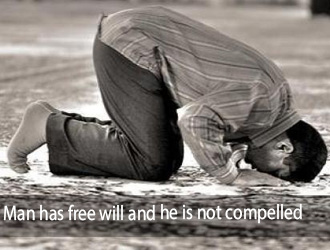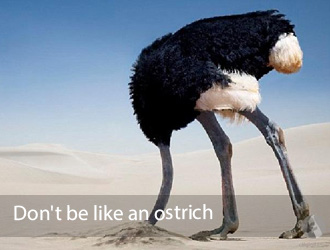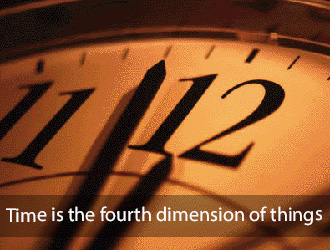- Islamic creed
- /
- Creed and Quran Miraculousness
Forward:
Dear brother, this is lesson No. 28 of the series Creed and the Inimitability of Quran. Last lecture we finished a series of subtopics of the major topic "lust", which is one of the constituents of the Divine Assignment, and before that, we talked about Al-Fitrah, the reasoning and the universe. These four major topics are among the constituents of the Divine Assignment.
1- Man is an honored and divinely assigned creature:
Man is the foremost creature according to the following Ayah:
﴾Truly, We did offer Al-Amanah (the trust or moral responsibility or honesty and all the duties which Allah has ordained) to the heavens and the earth, and the mountains, but they declined to bear it and were afraid of it (i.e. afraid of Allah's Torment). But man bore it.﴿
Man is the honored creature:
﴾And indeed We have honoured the Children of Adam, and We have carried them on land and sea, and have provided them with At-Taiyibat (lawful good things), and have preferred them above many of those whom We have created with a marked preference.﴿
Man is the creature who is Divinely assigned to worship the Almighty Allah:
﴾And I (Allah) created not the jinns and humans except they should worship Me (Alone).﴿
2- Man has agreed to bear the trust:
Allah would not have assigned us to worship Him without giving us the needed qualifications, on top of which are these constituents. This universe reflects the Existence of Allah, His Oneness and His Perfection. Allah has granted us the reasoning as enough means to get acquainted with Allah through this universe, He has granted us Al-Fitrah which is enough means to know the right and wrong things and He has given us lusts as motivating power through which we can exalt in the Sight of the Lord of the heavens and the earth. We talked about lusts in so many lectures.
Free will is one of the constituents of the Divine Assignment:
1- Man owns the free will in fulfilling the Divine Assignment:
Today we are discussing a new constituent of the Divine Assignment which is the free will. You, as a human being, have the free will, and the only doctrine which paralyzed the Ummah and kept it undeveloped is fatalism.  Fatalism means to mistakenly believe that Allah has imposed your actions on you. Well, had Allah obliged His servants to obey Him, the reward would have been nullified, and had He forced them to commit sins, punishment would have been pointless. "Had Allah left His servants live purposelessly, that would have indicated lack of Divine Ability…Allah, the Glorified, has ordered His people to act by free will and has cautioned them and refrained them (from evil). He has placed easy obligations on them and has not put heavy obligations. He gives them much (reward) in return for little (action). He is disobeyed, not because He is overpowered. He is obeyed but not under force."
Fatalism means to mistakenly believe that Allah has imposed your actions on you. Well, had Allah obliged His servants to obey Him, the reward would have been nullified, and had He forced them to commit sins, punishment would have been pointless. "Had Allah left His servants live purposelessly, that would have indicated lack of Divine Ability…Allah, the Glorified, has ordered His people to act by free will and has cautioned them and refrained them (from evil). He has placed easy obligations on them and has not put heavy obligations. He gives them much (reward) in return for little (action). He is disobeyed, not because He is overpowered. He is obeyed but not under force."
2- Fatalism is the doctrine which has crippled the Ummah:
Consider the following example: If the principal of a school gathers the students in the school yard on the first day of the academic year, and he mentions the names of the students who will succeed and the students who will fail in advance, will any of the students study? If they will have already known their results, so neither the student who will succeed nor the one who will fail will study.
There are Quranic Ayat which prove that man owns the free will:
Fatalism has paralyzed our Ummah and its misconceptions have been stored in the minds of people who think that everything in life is predestined and that Allah has decreed who will be happy and who will be miserable, but this is not true.
The first Ayah:
﴾"Go, both of you, to Fir'aun (Pharaoh), verily, he has transgressed (all bounds in disbelief and disobedience and behaved as an arrogant and as a tyrant)* "And speak to him mildly, perhaps he may accept admonition or fear Allah."﴿
The second Ayah:
﴾ Verily, We showed him the way, whether he be grateful or ungrateful.﴿
Man is either grateful or ungrateful which indicates that he has the free will.
The third Ayah:
﴾ For every nation there is a direction to which they face (in their prayers). So hasten towards all that is good.﴿
People have the choice to go to whatever direction. Will the man who sits next to the driver ask the man in the back seat to go right or left? Of course, he will not, but he will ask the driver to do so.
﴾ For every nation there is a direction to which they face (in their prayers).﴿
To whom "They" refers? If we say that it refers to Allah then there will be contradictions in our beliefs, so pay attention to the second part of the Ayah:
﴾So hasten towards all that is good.﴿
You should hasten (as a human being).
﴾ For every nation there is a direction﴿
This means that man takes the direction he chooses due to his full free will.
It is an outdated thinking to ascribe our errors to sh3er:
 Once, a drinker was brought to our master Umar (may Allah be pleased with him), and he ordered to carry out Al-Hadd (the legal punishment) on him, but the drinker ascribed his sin to Allah's Qadar (Divine Preordainment). Falsehood is old, and man tends to refer his errors to sh3er. If you ask a student who failed, "Why did you fail?" He will say, "It is because of this bad teacher". As if the student has nothing to do with his own failure, and that it is the result of the bad teacher, the difficult questions or the tough curriculum. Why does he not say that he is lazy and that he did not study hard? Man tends to ascribe his errors to sh3er just like the ostrich which buries its head in the sand to avoid the hunter who will obviously hunt it down.
Once, a drinker was brought to our master Umar (may Allah be pleased with him), and he ordered to carry out Al-Hadd (the legal punishment) on him, but the drinker ascribed his sin to Allah's Qadar (Divine Preordainment). Falsehood is old, and man tends to refer his errors to sh3er. If you ask a student who failed, "Why did you fail?" He will say, "It is because of this bad teacher". As if the student has nothing to do with his own failure, and that it is the result of the bad teacher, the difficult questions or the tough curriculum. Why does he not say that he is lazy and that he did not study hard? Man tends to ascribe his errors to sh3er just like the ostrich which buries its head in the sand to avoid the hunter who will obviously hunt it down.
The victim mentality is a prevailing disease among Muslims, what would one of us say upon finding a hole in the road? He would say that it is because of colonialism. We use our enemies, colonialism, Zionists and imperialism as hangers on which we hang all our errors. We are the ones who are erring and our mistakes led us to the bad situation, we are in, but we do not have the courage to admit that. You should be courageous enough to say, "We erred". If you ask the student who failed in the exam about the reason behind his failure, he will say to you, "Allah did not decree my success." Why did you not study? Why do you not say that you did not study?
It is about time to rectify our errors. Some people simply say, "This is Allah's Qadar", or "This is what Allah has managed". Unfortunately, whoever commits a mistake, falls short in doing something, does not fulfill his duties, does not perfect his job, does not pay heed or does not make use of the available means, and so he received the consequences of his carelessness, negligence, ignoring the available means or ignorance, says, "This is Allah's Will."
﴾ Say: "Nay, Allah never commands of Fahisha. Do you say of Allah what you know not?﴿
Dear brother, I am not exaggerating if I consider this point the most serious one in Aqidah, because the mere thinking that everything is Divinely determined, so that the miserable is predestined to be miserable and the happy is predestined to be happy and that there is no hope, will make us ask, why should we strive? What is the purpose of orders? What is the purpose of bans?
Orders and bans in Quran are proof of man's free will:
If the shoulder's width of a person is 63 centimeters and 8 millimeters, and we build two walls with a distance between them that is of the same width of his shoulder, then we ask him to pass through the two walls, obviously his right shoulder will touch the right wall and his left shoulder will touch the left wall when he passes through, so will not it be ironic if we say to him, "Turn to the right". Is there any right turn? This path has exactly the width of his shoulder, so there is no other option but to go forward. In this case asking him to make a right turn is a meaningless order, isn't it? Listen to the proof that refutes fatalism: since there are orders and bans in the Noble Quran, you have the free will, otherwise these orders and bans are purposeless.
﴾ Verily, We showed him the way, whether he be grateful or ungrateful.﴿
The fourth Ayah:
﴾ Then whosoever wills, let him believe, and whosoever wills, let him disbelieve. ﴿
﴾ For every nation there is a direction to which they face (in their prayers). So hasten towards all that is good.﴿
The key Ayah that indicates the free will of man is the following:
The fifth Ayah:
﴾ Those who took partners (in worship) with Allah will say: "If Allah had willed, we would not have taken partners (in worship) with Him, nor would our fathers, and we would not have forbidden anything (against His Will)." Likewise belied those who were before them, (they argued falsely with Allah's Messengers), till they tasted of Our Wrath. Say: "Have you any knowledge (proof) that you can produce before us? Verily, you follow nothing but guess and you do nothing but lie."﴿
Is not this Ayah enough proof? Are those not the words of Allah? Is not that guidance from the Almighty Allah?
The matters in life in which man is Musayyar: Divinely Predestined:
You own the free will; and this issue needs to be tackled in details. What are the matters that you have the free choice to determine?
1- Man has no choice in his gender:
The minute fact is that you are Musayyar (you have no choice in matters that are Divinely Predestined) and Mukhayyar (you have the free will in matters which are not divinely Predestined), so what are the matters that you are Musayyar in?  Do you have any choice in being a male or a female, and was anyone of you offered to choose between being a male or a female? You are Musayyar in your gender, aren't you? Had the Divine Wisdom been revealed to you, you would have found that Allah has chosen the best for you. A scholar said, "What I expect can never be better than what Allah has already granted me." Thus, had Allah disclosed things for you, you would have discovered that due to His Divine Wisdom it is better for you to be a male, and had Allah disclosed things for you, you would have discovered that due to His Divine Wisdom it is better for you to be a female. Accordingly, being a male or a female is one of the matters in which you are Musayyar.
Do you have any choice in being a male or a female, and was anyone of you offered to choose between being a male or a female? You are Musayyar in your gender, aren't you? Had the Divine Wisdom been revealed to you, you would have found that Allah has chosen the best for you. A scholar said, "What I expect can never be better than what Allah has already granted me." Thus, had Allah disclosed things for you, you would have discovered that due to His Divine Wisdom it is better for you to be a male, and had Allah disclosed things for you, you would have discovered that due to His Divine Wisdom it is better for you to be a female. Accordingly, being a male or a female is one of the matters in which you are Musayyar.
2- Man is Musayyar in his parents:
 Did anyone of you choose his parents?
Did anyone of you choose his parents?  You are Musayyar in the parents you have got.
You are Musayyar in the parents you have got.
3- Man is Musayyar in the place of his birth:
Who among you have chosen the place of his birth? Some people are born in Damascus, while sh3er are born in Chicago. Thus, you are Musayyar in the place of your birth.
4- Man is Musayyar in the date of his birth:
All of our generation existed in the twentieth century, and after 100 years, no one of the people on earth (now) will exist, and 100 years ago none of you existed on the surface of earth. Thus, you are Musayyar in the date of your birth. I repeat, you are Musayyar in your gender, in your parents, in the place of your birth and in the date of your birth.
5- Man is Musayyar in the way he looks like:
If you are a tall man, this is good but do you have any choice in that? If you are short, do you have any choice in that?  If you have a fair or dark skin, do you have any choice in that? The same goes for your looking, color, characteristics and other matters like cleverness, good memory, good comprehension or right judgment. Therefore, you have no choice in your characteristics and potentials.
If you have a fair or dark skin, do you have any choice in that? The same goes for your looking, color, characteristics and other matters like cleverness, good memory, good comprehension or right judgment. Therefore, you have no choice in your characteristics and potentials.
The condition you are in is the best choice for you:
The most crucial point in being Musayyar or Mukhayyar is that whatever Allah has granted to you and whatever condition you are are the best for you to make you happy and to protect you. This is why people, on the Day of Resurrection and when the facts and the truth are disclosed, will summarize their connection with Allah as follows:
﴾ and the close of their request will be: Al-Hamdu Lillahi Rabbil-'Alamin [All the praises and thanks are to Allah, the Lord of 'Alamin (mankind, jinns and all that exists)].﴿
It was said, "If the unseen is disclosed, you will choose your reality." As I said earlier, you are Musayyar in your gender, parents, the place of your birth, the date of your birth and the characteristics you have.
Man owns the free will concerning the Divine Orders and Bans:
You are Mukhayyar in matters related to the Divine Assignment, so when you are ordered to offer Salah, you have the free will to pray or not, when you are ordered to be upright, you have the free will to be upright or to go astray, when you are ordered to be honest, you have the choice to be honest or not, when you are ordered to be just, you have the free will to be just or unjust, when you are ordered to be merciful to those around you, you have the choice to be merciful or to be cruel, when you are ordered to be dutiful to your parents, you have the free will to serve them or to neglect them and when you are ordered to seek knowledge, you have the choice to come to this lecture and to this Masjid or to stay at home or to head to a night club, isn't that true? This is the reality of things and you have the free will to choose whatever you wish and whatever you are Divinely Assigned to.
﴾ Verily, We showed him the way, whether he be grateful or ungrateful.﴿
﴾ Then whosoever wills, let him believe, and whosoever wills, let him disbelieve. ﴿
﴾ For every nation there is a direction to which they face (in their prayers.﴿
Had you not been Mukhayyar, rewarding, punishing, Paradise, Hellfire, the Divine Assignment and the trust would have been pointless, and your deeds would have never been valued. When you give your cellular phone to a burglar at gunpoint, would you feel that you offered a good deed? Would you feel the ecstasy of faith by giving him your cellular phone? Absolutely you would not, because you are obliged to give him the phone.
The optional guidance not the forced one is what counts:
Let me tell you the following: If Allah willed, all mankind would have become believers:
﴾ And had your Lord willed, those on earth would have believed, all of them together.﴿
If your Lord had willed, those on earth would have believed, and it is an easy task, for the enforced guidance is very easy, but such guidance will not bring happiness at all. If I say to you that a dean of a university decides that the rates of success will be 100%, but how? He will give the answers to all students before the exams, with the grades of passing on every exam paper, and all the students have to do is just writing their names, and everyone will pass the exam by flying colors. Is this success worthwhile in the people's sight? No. it is not, it is worthless to people, to the students and to the administration of the university. Much in the same line, the enforced guidance is worthless.
guidance is very easy, but such guidance will not bring happiness at all. If I say to you that a dean of a university decides that the rates of success will be 100%, but how? He will give the answers to all students before the exams, with the grades of passing on every exam paper, and all the students have to do is just writing their names, and everyone will pass the exam by flying colors. Is this success worthwhile in the people's sight? No. it is not, it is worthless to people, to the students and to the administration of the university. Much in the same line, the enforced guidance is worthless.
Let me give you an example that seems funny. If whoever looks at a girl will lose his sight, what will the atheists do? They will lower their gaze, because they fear losing their sight. Basically, this is the only way people obey the powerful people and the tyrants, but is this obedience optional? No, it is not! It is an enforced obedience. Think about it, if Allah forces us to obey Him, this is something easy to be do, but it will be valueless obedience and meaningless one, and it will not bring happiness or exaltation to anyone. What exalts people is to turn to Allah willingly taking the initiative in choosing to obey and to love Him. As if Allah meant for the relation between Him and His servants to be based on love:
﴾ whom He will love and they will love Him﴿
This is the frame of reference of all the Ayat that include guiding people:
﴾ And had your Lord willed, those on earth would have believed, all of them together.﴿
This is the meaning of the Ayah. As I have just said, the obligatory guidance is worthless; it neither exalts nor pleases you. When a beautiful girl passes by you and instead of feasting your eyes on her beauty you choose by your free will to lower your gaze because you fear Allah, love Him and obey Him, and you say, "I fear Allah, the Lord of the 'Alamin (mankind, jinns and all that exists)", then this kind of guidance is the worthwhile one. Also, when you have the choice to wake up at Al-Fajr to offer Salah in the chilly winter, and you choose by your free will to leave your cozy bed though your body is yearning for warmth, remove the covers, offer Wudu and pray, then this kind of optional guidance is the worthwhile one. Allah wants you to come to Him by your free will, He wants you to obey Him by your full free choice, He wants you to be initiative in turning to Him and He wants your relation with Him to be based on love and affection.
Difference between the servant of gratitude and the servant of compulsion:
This is why there are two Arabic words for the plural of servants of Allah: the first word is "Ibad", and the second one is "Abeed". The second word includes all mankind even the atheists, the sinners and the fornicators, and it means that man is in the Hand of Allah in every second, and thus Allah is able to afflict him with a stroke in one of his brain blood vessels that will be enough to change him from a zealous active person to a paralyzed mute one. Furthermore, at any moment man might have a heart attack, and at any second cells of man's body might grow randomly to form cancer which is still a challenge to mankind even after all the scientific breakthroughs, for cancer is an intractable disease. Since you are in the Hand of Allah, you are "Abd", but when you choose to ponder over the universe in order to get acquainted with Allah, to approach him, to love Him, to reauthor His Book, to perform the acts of worship and to offer good deeds to serve His creations, you will be Abd (a worshipping servant) the singular of Ibad.
﴾ And the slaves of the Most Beneficent (Allah) are those who walk on the earth in humility and sedateness﴿
﴾ and your Lord is not at all unjust to (His) slaves.﴿
Thus "Abeed" is the plural of "Abd" the common servant of Allah who is in the Hand of Him by force, whereas "Ibad" is the plural of "Abd" the worshipping servant who shows his gratitude to Allah by choice. You, as a human being, own the free will, and had you not owned it, your deeds and worship would have been valueless, had Allah obliged His servants to worship Him, reward would have been pointless and Had Allah forced His servants to sin, punishment would have been meaningless. Also, "there would have been no sense in Allah's promises or warnings. (On the other hand) Allah, the Glorified, has ordered His people to act by free will and has cautioned them and refrained them (from evil). He has placed easy obligations on them and has not put heavy obligations. He gives them much (reward) in return for little (action)."
A man asked Imam Ali, may Allah be pleased with him, "Was our going to fight against the Syrians destined by Allah?" Ali, may Allah be pleased with him, said, "Woe to you. You take it as a final and unavoidable destiny (according to which we are bound to act). If it were so, there would have been no question of reward or chastisement and there would have been no sense in Allah's promises or warnings. (On the other hand) Allah, the Glorified, has ordered His people to act by free will and has cautioned them and refrained them (from evil). He has placed easy obligations on them and has not put heavy obligations. He gives them much (reward) in return for little (action). He is disobeyed, not because He is overpowered. He is obeyed but not under force."
The interpretation of the Ayat which seem to force man in some matters:
Dear brother, man sometimes needs to ask a scholar about the interpretation of some Ayat in the Quran, for he might misunderstand an Ayah the first time he reads it. One of those Ayat is the following:
﴾ And if We had willed, surely! We would have given every person his guidance, but the Word from Me took effect (about evil-doers), that I will fill Hell with jinn and mankind together.﴿
The apparent meaning of the Ayah is scary, but the real meaning of it is that Allah is addressing people and saying to them, "You claim that I forced you to do your evil doing, but had it been true that I forced you, then I would have with greater reason forced you to be guided, and then I would have canceled your free will, the Divine Assignment, the trust you accepted to bear, the Divine Message and your identity as the only creature who is Divinely Assigned. Man bore the trust, and Allah, Glorified and Sublime be He, says:
﴾ Truly, We did offer Al-Amanah (the trust or moral responsibility or honesty and all the duties which Allah has ordained) to the heavens and the earth, and the mountains, but they declined to bear it and were afraid of it (i.e. afraid of Allah's Torment). But man bore it.﴿
I repeat, Allah means, "Had I forced you to be guided, I would have canceled your free will, the Divine Assignment, the trust undertaken by you, the Divine Message and your identity as the only creature who is Divinely Assigned.
﴾ And if We had willed, surely! We would have given every person his guidance,﴿
Your wrongdoings are not imposed on you by Allah, but they are done by your own will. Therefore, you will be called to account for them, and you will pay a high price for doing them.
﴾ And if We had willed, surely! We would have given every person his guidance, but the Word from Me took effect (about evil-doers), that I will fill Hell with jinn and mankind together.﴿
This is the punishment for their bad deeds, crimes and oppression. Hence, the gravest mistake is to ascribe your error to another party. The best example to clarify this point, and I may say it is the most obvious one is the situation of the student who never studies and upon failing he will say, "This is Allah's Will Allah, Glorified and Sublime be He, did not decree that I pass the exam". Glory be to Allah! Do these kinds of claims not make you laugh? These are unacceptable excuses, but unfortunately they are adopted by Muslims nowadays.
When you say to someone, "Why do you not pray?", he replies, "Allah has not guided me to His Path yet", and if you ask someone, "Why are you not upright?", he answers, "Allah has not guided me yet". This is how man ascribes all his errors, sins and shortcomings to Allah, Glorified and Sublime be He. This is the foremost problem Muslims suffer from, and this is why they do not get themselves ready against their enemies. Allah, Glorified and Sublime be He, says:
﴾ And make ready against them all you can of power, including steeds of war (tanks, planes, missiles, artillery, etc.) to threaten the enemy of Allah and your enemy﴿
They have been preparing against us, but we have not. They have prepared lethal weapons to fight us, and so they have enforced their culture all over the world, and they have spread their immortality and life style. This is globalization; this is the clearest manifestation of globalization. It is imposing the culture, the immortality and the dissoluteness of a powerful country on the entire world. We have felt short in preparing against them, while they have made ready all their power against us, and they have been working on this at night, whereas we stay in bed till afternoon.
I hope that the Muslim stops ascribing his errors to sh3er. If we want to go deeper in this topic, you will notice that most of the mistakes done by your children are because of you as a father, and most of the mistakes done by students are because of you as a teacher. Do not run away from the responsibility of your mistakes, be brave and tell the truth by saying, "I am mistaken. I did not raise my children properly, and this is what made them like this."
Dear brother, it is a brave stance to admit your responsibility for your own mistakes.
﴾ And if We had willed, surely! We would have given every person his guidance, but the Word from Me took effect (about evil-doers), that I will fill Hell with jinn and mankind together.﴿
Dear brother, let me draw your attention to a delicate fact. Allah is the All-Knowing, so He knows what is going to happen, but this Knowledge is related to the Divine Ability to know what is going to happen, so it is not a compelling one (This knowledge has nothing to do with imposing actions and deeds on us).
Allah, Most High, blames man for falling short:
 Dear brother, the Prophet, peace be upon him, said in a very important Hadith which indicates a crucial and decisive point:
Dear brother, the Prophet, peace be upon him, said in a very important Hadith which indicates a crucial and decisive point:
((Allah, Most High, blames for falling short…..))
Muslims should neither give up nor say, "We are helpless and it is over because our enemies are stronger than us", because saying this is a big mistake.
((Allah, Most High, blames for falling short, but apply intelligence, and when the matter gets the better of you, say; For me Allah is sufficient, and He is the best disposer of affairs.))
When should anyone say, "Hasibiya Allah Wa Ni'ma Al Wakeel" (For me Allah is sufficient, and He is the best disposer of affairs)? You can say so if something overcomes you:
((...say; For me Allah is sufficient, and He is the best disposer of affairs.))
The first example I would like to give concerning this point is the following. The student who did not study at all, but he started saying upon failing, "Allah did not decree that I pass the exams", "Allah did not will that I succeed" or "It is the teacher's fault who wrote tough questions", should know that he is mistaken. If it is the case with you, you should say, "I did not study", for this is the scientific, moral and faith related stance. On the other hand, if you study hard but you get sick before the exam, only then you can say:
(( For me Allah is sufficient, and He is the best disposer of affairs.))
Our Master Umar, may Allah be pleased with him, saw a group of beggars in Hajj, so he asked them, "Who are you?" They replied, "We are the Mutawakkiloon (those who put their trust in Allah after making use of the available means." To which he said, "No, you are not… The Mutawakkel is a person who plants crops while putting his trust in Allah that his crops will grow and produce fruit." One should use the available means as if they are enough to meet his needs, and then he should put his trust in Allah as if they are not sufficient at all, and this is the true faith. Accordingly, the true faith entails that we should:
﴾ And make ready against them all you can of power,﴿
The three kinds of poverty:
The true faith urges you to develop your job, to be distinguished in your specialty, to enrich your experience and to overcome every fault in your life, and then you can say, "For me Allah is sufficient, and He is the best disposer of affairs". Hence, after you do your best, you give in to Allah's Qada' and Qadar (the Divine Predestination and Preordainment). Therefore, giving in to the Qada' and Qadar should happen after using all the available means. Unfortunately, the majority of people is not like that, and let me say that there are poor people because of laziness, imperfection, unpunctuality, having bad commodities, carelessness and negligence, and because they have no improvements, they do not follow up on their work and their accounts are inaccurate. Such people will become poor, and this is the poverty out of laziness. Hence, it is a big mistake to say that this sort of poverty is destined by Allah, Glorified and Sublime be He, because it is the outcome of your own actions and your own laziness. Since, your job lacks perfection, improvement, honesty, trustworthiness, attracting consumers, kind treatment and accurate calculations, your store will not be in a good situation, and the consumers will prefer going to other stores. After all that, the store owner says, "I cannot make a living in here, for Allah did not destine provision for me."Saying such a thing is ridiculous, so you should say instead, "I neglected my job, so people were fed up with my carelessness, and they headed to other stores." This is the poverty that is caused by of laziness. On the other hand, there is the predestined poverty. It happened when, for instance, Allah afflicts someone with a physical disability that does not enable him to make a good living.
Our master Abu Bakr, may Allah be pleased with him, became poor because of spending all his wealth in the Cause of Allah:
((One day, the Messenger of Allah, peace be upon him, commanded his companions to give charity, so Abu Bakr brought all that he had with him. The Messenger of Allah, peace be upon him, asked him, 'What have you left for your family?' He replied, 'I have left Allah and His Messenger for them.'))
Thus, there is the poverty of laziness and the predestined poverty, while the third sort of poverty is the one which is the outcome of spending on the needy and the poor. The poor man because of laziness is condemned, the poor man because of Qadar is excused and the poor man because of spending on the poor is praised.
Once I attended a big Islamic conference in Malaysia, and I delivered a speech addressing the Arab nation, in that speech I said, "You ascribe your faults to Qadar and this is the reason behind your backwardness. You keep saying, 'Allah did not decree that Ummah is victorious', while you just wait for it. Well, victory is never achieved by waiting, but rather it is achieved by striving,
'And make ready against them all you can of power, including steeds of war (tanks, planes, missiles, artillery, etc.)
Using the available means is necessary according to reasoning and Shari'ah:
The beliefs adopted by the contemporary Muslim are absolutely unacceptable. He just prefers to stay inactive. Umar, may Allah be pleased with him, once saw some camels afflicted with a skin disease (scabies), so he asked the people what they planned to do to treat the camels' affliction. They told him that they had among them a pious old man who went out to the camels every day and prayed to Allah to heal them. To this Umar said, "Along with the old man's supplication, you should place tar upon the camels' skin." (Tar was an effective medical treatment for that particular disease.) Use the available means (as Umar, may Allah be pleased with him) indicated, "Along with the old man's supplication, you should place tar upon the camels' skin."
the old man's supplication, you should place tar upon the camels' skin."
In some cases the Muslim hits the road on a trip without checking his car, forgetting that there could be some defects that might cause his death like having a problem with breaks. If he has an accident, and he says, "Glory be to Allah, it is just Qada' and Qadar", then he should know that he is mistaken, because this is the outcome of his negligence. Qada' and Qadar are something else; if someone checks on his car, on the breaks, on the tires and on everything, and then he puts his trust in Allah, but for Divine profound Wisdom he has an accident, only then he can say that it is Qada' and Qadar.
Beware of considering the consequences of your mistakes Qada' and Qadar, because they are resulted from falling short. On the other hand, you can consider something Qada' and Qadar when you use the available means, and then you put your trust in Allah, so whatever happens after that is Qada' and Qadar. We will continue this topic in the next lecture insha' Allah.
The scientific topic:
Dear brother, westerners brag about Einstein, the famous German physicist, and I consider this man a special one, because he said the following, "He who does not see the Power in this universe that is the most Powerful, the Knowledgeable that is the most knowledgeable, the Merciful that is the Most Merciful and the Wise that is the Wisest, is considered a living dead."
1- Theory of relativity:
This outstanding statement was said by the famous physicist, who put the theory of relativity that has totally changed all the concepts of physics, energy, power and motion in the world. Depending on this theory he discovered the absolute speed in the universe which is the speed of light. The speed of light is 300.000 kilometers per second. Accordingly, if our lecture lasts for 60 minutes, the light will travel 18 million kilometers during the time of this lecture. Hence, this scientist discovered the absolute speed in the universe, which is the approximate speed of the light: it is 300.000 kilometers per second, and whatever travels as fast as the light becomes light itself. Thus, had time passed as fast as the light, it would have lost its nature, and it would have become light. The same goes for whatever is as fast as light.
2- Time is the fourth dimension:
In order to draw a (one dimensional) line we move from a specific point straight up to another point, and in order to have a (two dimensional) plane surface we move from a specific line to another line, and in order to have a three dimensional shape we move the surface, and in order to have time we move the three dimensional shape. Accordingly, time has been defined as follows: It is the fourth dimension of things.
 This table in front of me for example has a length, a width and a height, but after 20 years its color will fade, so the change of its color is the fourth dimension. The stairs of the old buildings will be worn out upon using them and the string leaves a trace on the old sewing machine which was manufactured in 1930. Time is the fourth dimension, and upon moving and using things, changes happen. Your shirt has a weight and dimensions, but upon wearing it for five years, it will become worn-out in some places and its colors will fade. Thus, the fourth dimension of things is the changes that take place because of the passage of time.
This table in front of me for example has a length, a width and a height, but after 20 years its color will fade, so the change of its color is the fourth dimension. The stairs of the old buildings will be worn out upon using them and the string leaves a trace on the old sewing machine which was manufactured in 1930. Time is the fourth dimension, and upon moving and using things, changes happen. Your shirt has a weight and dimensions, but upon wearing it for five years, it will become worn-out in some places and its colors will fade. Thus, the fourth dimension of things is the changes that take place because of the passage of time.
3- Inanimate objects, plants, animals and mankind:
An inanimate object is, by definition, something that occupies a space, and it has three dimensions and weight, whereas a plant, having three dimensions and weight, occupies a space, and it also grows, so growth is the difference here. On the other hand, animals occupy a space, they have three dimensions and weight, like inanimate objects and they grow like plants. Furthermore, they move and walk. Man occupies a space, he has three dimensions and weight, he moves and grows and above all, he thinks. The only privilege Allah has granted you and made you distinguished with is thinking.
4- Whatever travels as fast as light will become light itself:
Depending on the theory of relativity, whatever catches up with light speed turns into light. In this lecture and place there is light, and we are receptors of this light that is transmitted into the outer space at the speed of light (300.000 kilometers per second). Thus, if man supposedly managed to build a spaceship that travels in light speed and travels along with light waves, the scene of our meeting would be preserved forever and ever. If we were able to build a spaceship that is supposedly able to travel faster than light speed, we would be able to see with our own eyes the battles of Badr, Uhud, Al-Khandaq, Al-Qadisiyah and Al-Yarmook. Hence, if we travelled at the light speed, time would come to a halt for good, and if we travelled little slower than the light speed, time would become very slow and an hour in the space would be equal to 1000 earthy years.
5- The Quranic breakthrough with regard to the theory of relativity:
The fifth conference of the inimitability of the Quran was held in Moscow, and a very serious topic was tackled in it proving that this giant theory (the theory of relativity), brought by Einstein, is mentioned in the Quran through few words. Allah says:
﴾ And verily, a day with your Lord is as a thousand years of what you reckon.﴿
Allah the Almighty is addressing the Arabs in this Ayah "you reckon", because Arabs used the lunar calendar, and they were counting the years by the lunar year. The moon orbits the earth once per month, and if we take the center of the earth and the center of the moon and draw a straight line between the two, this line (according to architects and mathematicians) is the half diameter of a circle that is equal to the moon's orbit around the earth. It is easy to calculate that: half diameter of the earth plus half diameter of the moon plus the distance between the two equal half diameter of the moon's orbit around the earth. If we multiply that by 2, we will get the diameter of the orbit, and if we multiply that by 3.14 we will get the circumference of the orbit, and if we multiply that by 12 (the months of a year) then multiply that by 1000 years (any junior high student can easily do that by a calculator) we will have the distance that the moon travels in 1000 years and this number will be in kilometers.
If we divide the result we get on the sum of seconds in 1000 years, we will get the speed of light which is precisely 299.752. Thus, the distance the moon travels in 1000 years equals the distance that the light travels in one day:
﴾ And verily, a day with your Lord is as a thousand years of what you reckon.﴿
The research about this subject is more than 80 pages, but I give you the summary, and it was presented in the 5th conference of the inimitability if the Quran in the very capital (Moscow) whose slogan was "There is no Deity to worship", but due to Profound Wisdom, the falsehood always vanishes as Allah, Glorified and Sublime be He, said:
﴾ Batil is ever bound to vanish." ﴿
Indeed Batil was refuted as the conference of the scientific inimitability of the Quran in Moscow was held.

 [Abu Dawod and Ahmad]
[Abu Dawod and Ahmad]

